2023届高三英语二轮专题谓语动词动词时态和语态课件(25张)
文档属性
| 名称 | 2023届高三英语二轮专题谓语动词动词时态和语态课件(25张) |  | |
| 格式 | pptx | ||
| 文件大小 | 668.4KB | ||
| 资源类型 | 教案 | ||
| 版本资源 | 通用版 | ||
| 科目 | 英语 | ||
| 更新时间 | 2022-09-25 20:54:48 | ||
图片预览


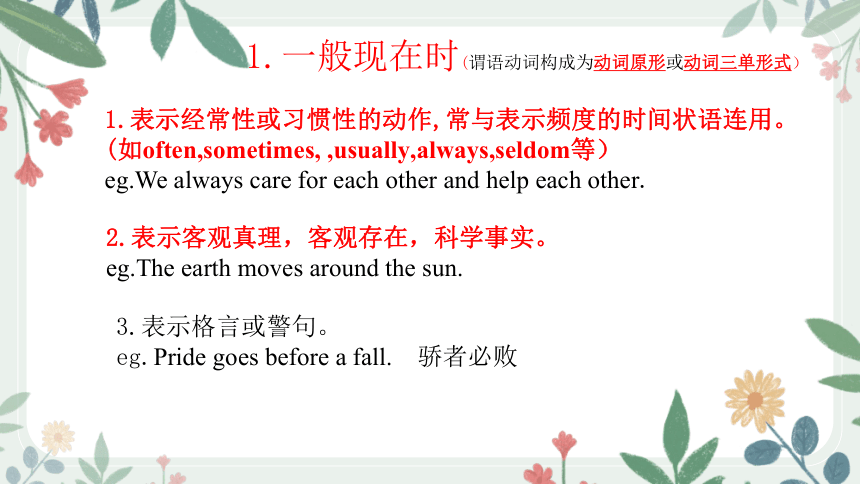
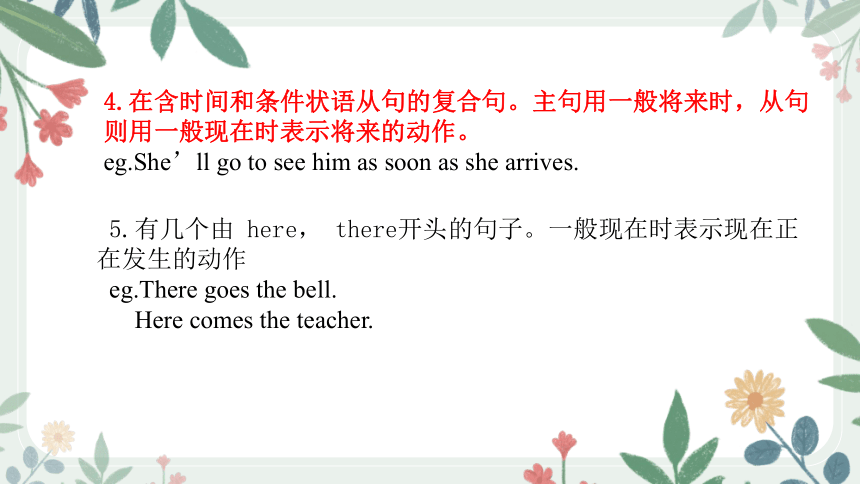
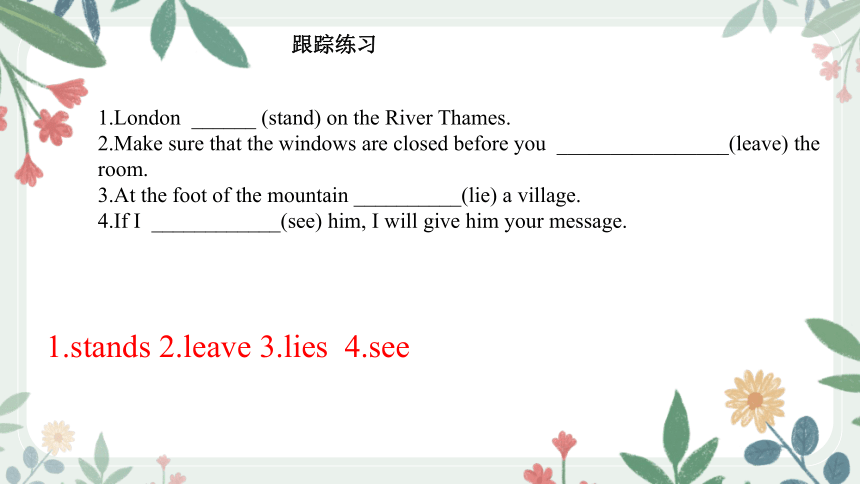
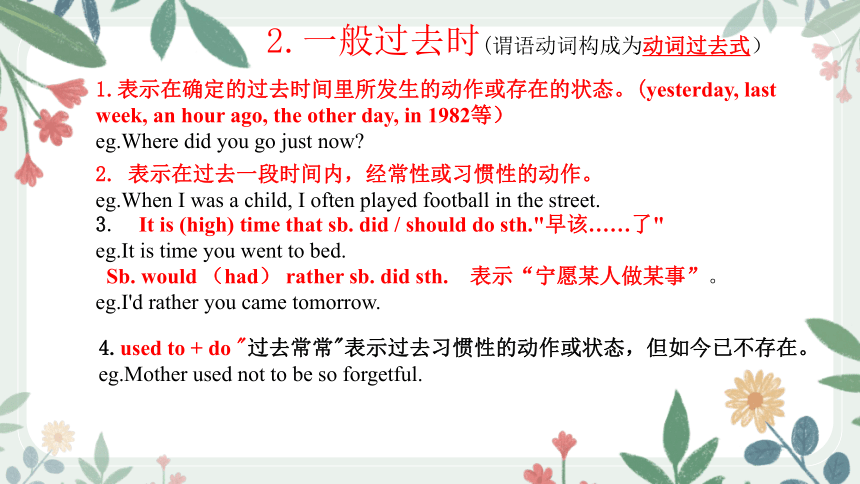
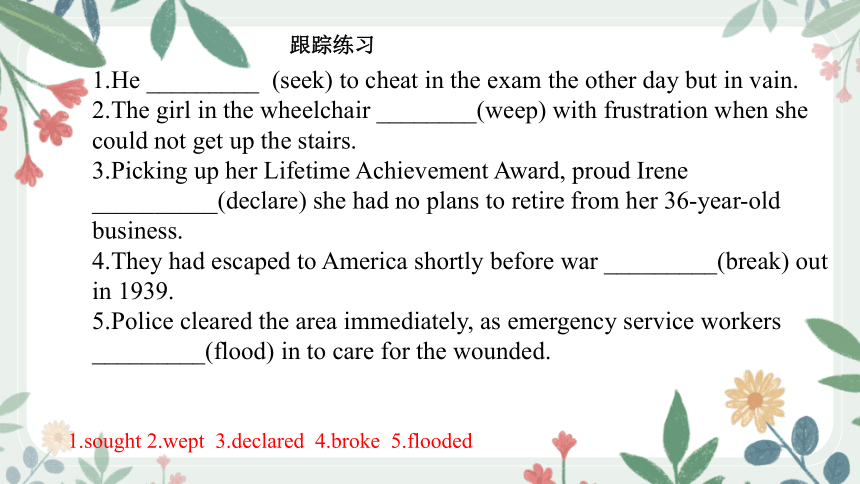
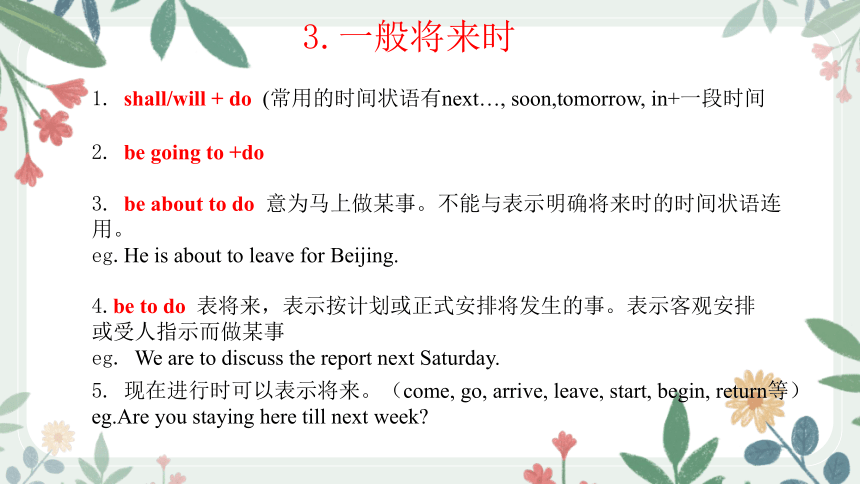
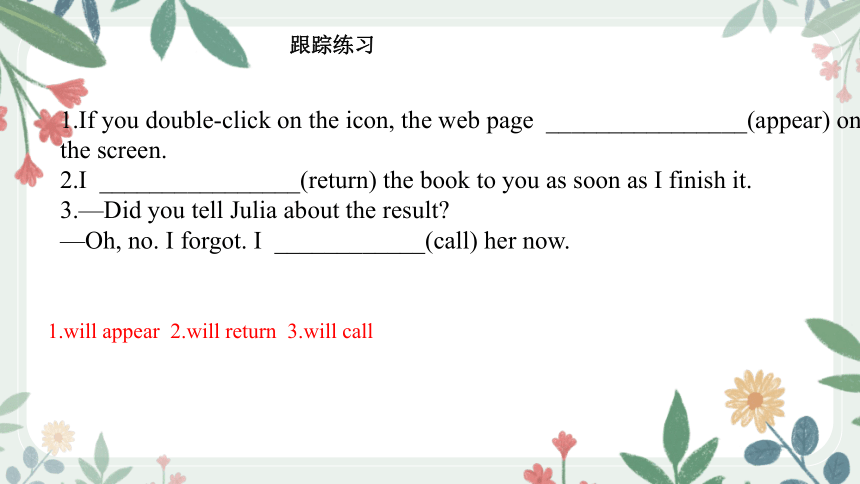
文档简介
(共24张PPT)
语法专题一:动词时态和语态
时态是表示行为、动作和状态在各种时间条件下的动词形式。高考语法填空常考的时态有:一般现在时、一般过去时和现在完成时。学生在写作文时,一般将来时也经常需要用到。
1.一般现在时(谓语动词构成为动词原形或动词三单形式)
1.表示经常性或习惯性的动作,常与表示频度的时间状语连用。(如often,sometimes, ,usually,always,seldom等)
eg.We always care for each other and help each other.
2.表示客观真理,客观存在,科学事实。
eg.The earth moves around the sun.
3.表示格言或警句。
eg.Pride goes before a fall. 骄者必败
4.在含时间和条件状语从句的复合句。主句用一般将来时,从句则用一般现在时表示将来的动作。
eg.She’ll go to see him as soon as she arrives.
5.有几个由 here, there开头的句子。一般现在时表示现在正在发生的动作
eg.There goes the bell.
Here comes the teacher.
跟踪练习
1.London ______ (stand) on the River Thames.
2.Make sure that the windows are closed before you ________________(leave) the room.
3.At the foot of the mountain __________(lie) a village.
4.If I ____________(see) him, I will give him your message.
1.stands 2.leave 3.lies 4.see
2.一般过去时(谓语动词构成为动词过去式)
1.表示在确定的过去时间里所发生的动作或存在的状态。(yesterday, last week, an hour ago, the other day, in 1982等)
eg.Where did you go just now
2. 表示在过去一段时间内,经常性或习惯性的动作。
eg.When I was a child, I often played football in the street.
3. It is (high) time that sb. did / should do sth."早该……了"
eg.It is time you went to bed.
Sb. would (had) rather sb. did sth. 表示“宁愿某人做某事”。
eg.I'd rather you came tomorrow.
4.used to + do "过去常常"表示过去习惯性的动作或状态,但如今已不存在。
eg.Mother used not to be so forgetful.
跟踪练习
1.He _________ (seek) to cheat in the exam the other day but in vain.
2.The girl in the wheelchair ________(weep) with frustration when she could not get up the stairs.
3.Picking up her Lifetime Achievement Award, proud Irene __________(declare) she had no plans to retire from her 36-year-old business.
4.They had escaped to America shortly before war _________(break) out in 1939.
5.Police cleared the area immediately, as emergency service workers _________(flood) in to care for the wounded.
1.sought 2.wept 3.declared 4.broke 5.flooded
3.一般将来时
1. shall/will + do (常用的时间状语有next…, soon,tomorrow, in+一段时间
2. be going to +do
3. be about to do 意为马上做某事。不能与表示明确将来时的时间状语连用。
eg.He is about to leave for Beijing.
4.be to do 表将来,表示按计划或正式安排将发生的事。表示客观安排或受人指示而做某事
eg. We are to discuss the report next Saturday.
5. 现在进行时可以表示将来。(come, go, arrive, leave, start, begin, return等)
eg.Are you staying here till next week
跟踪练习
1.If you double-click on the icon, the web page ________________(appear) on the screen.
2.I ________________(return) the book to you as soon as I finish it.
3.—Did you tell Julia about the result
—Oh, no. I forgot. I ____________(call) her now.
1.will appear 2.will return 3.will call
2. 表示现阶段长期的或重复性的动作,说话时动作未必正在进行。
eg.Mr. Green is writing another novel. (说话时并未在写,只处于写作的状态。)
4.现在进行时(am/is/are+ doing)
1. 表示现在(指说话人说话时)正在发生的事情。
eg.We are waiting for you.
3. 表示渐变 (get, grow, become, turn, run, go, begin等)
eg.It’s getting warmer and warmer.
The leaves are turning red.
4. 与always, constantly, forever 等词连用,表示反复发生的动作或持续存在的状态,往往带有说话人的主观色彩。
eg.You are always changing your mind.
跟踪练习
1.Our vacation _____ (approach), but we still can't decide where to go.
2.The students of our class ____________(visit) the museum now.
3.Hurry up! The train ____________(leave).
4.This song sounds very pleasant. Let's go upstairs and see who ___________(sing).
5.When’s food I’m ___________(starve).
1.is approaching 2.are visiting 3.is leavig 4.is singing 5.starving
5.过去进行时(was/were+doing)
表示过去某一时刻或某一段时间内正在进行的动作.(常用时间状语this morning, the whole morning, all day yesterday, from nine to ten last evening, when, while等)
eg. She was reading at that time.
1.He said the train ________________(leave) at six the next morning.
2.The children __________(play) football happily on the playground when it began to rain heavily.
1.was leaving 2.was playing
6 现在完成时(has/have+done)
1. 表示从过去开始,持续到现在的动作或状态,往往和“for+时间点”, “since+时间段”表述的一段时间状语连用; 和till/until, up to now, so far等表示到目前为止的时间状语连用。
eg.They have worked here since they left college.
2. 表示过去发生或已完成的动作对现在产生的影响或结果。常与already, ever, never, just ,yet等副词连用。
eg.I have finished the report. She has cleaned the room.
▲“since法”:It is/has been three years since he joined the army.
It (This) is(will be ) the first/second/third…time+ that + 主语+have done ….
跟踪练习
1.Corn production has jumped nearly 125 percent over the past 25 years, while rice_____(increase) only 7 percent.
2.The musician along with his band members _______________ (give) ten performances in the last three months.
3.You don't need to describe her. I ________________(meet) her several times.
4.They have been discussing the problem for two hours, but they ______ (not reach) any result yet.
5.My car _____________(behave) well since it was repaired.
1.has increased 2.has given 3.have met 4.haven’t reached 5.has behaved
7.现在完成进行时(has/have been doing)
1. 用来表示从过去某一时刻开始一直持续到现在(或今后还可能继续下去)的动作
eg.He has been doing the math problems since 8:00.
We ______ (work) on this project for four hours. Let's have a rest.
have been working
8.过去完成时(had+done)
1、过去完成时表示过去的过去,只有在两个过去发生的动作相比较时才可显示出来。
eg.When we got to the station, the train had left.
2、过去完成时表示截止到过去某一时间已经完成的动作。
By the end of last month, we had reviewed four books.
3.表示过去未曾实现的希望、打算或意图。
(常与hope, intend, mean, expect, think, want, suppose等连用)
eg. I had wanted to pay a visit to you yesterday, but the rain prevented me.
1.I ______ (mean) to take a good holiday this year, but I was not able to leave.
2.I began collecting stamps in February and by November I _____ (collect) more than 2,000.
1.had meant 2.had collected
1.(2019江苏,22)The musician along with his band members___________ (give)ten performances in the last three months.
2.(2019江苏,29)A few months after he had arrived in China, Mr. Smith __________(fall) in love with the people and culture there.
3.(2019天津,2)I __________(hope) to send Peter a gift to congratulate him on his marriage, but I couldn’t manage it.
4.(2018北京,1)—Hi, I’m Peter. Are you new here I haven’t seen you around.
—Hello, Peter. I’m Bob. I just_________(start) on Monday.
5.(2018北京,4)Susan had quit her well-paid job and_________(work) as a volunteer in the neighborhood when I visited her last year.
6.(2018北京,7)China’s high-speed railways___________(grow) from 9,000 to 25,000 kilometers in the past few years.
1.has given 2.fell 3.had hoped 4.stated 5.was working 6.have grown
7.(2017北京,24)—__________ (do)you call that company to see how they think of our product yesterday
—Yes. They are happy with it.
8.(2017北京,33)People __________(have) better access to health care than they used to, and they’re living longer as a result.
9.(2017天津,8)I ___________(drive) down to London when I suddenly found that I was on the wrong road.
10.(2017江苏,31)He’s been informed that he__________(do)not qualify for the scholarship because of his academic background.
11.(2016北京,21)Jack ________(work)in the lab when the power cut occurred.
12.(2016北京,25)I ___________(read)half of the English novel, and I’ll try to finish it at the weekend.
13.(2016江苏,29)Dashan, who___________ (learn)crosstalk, the Chinese comedic tradition, for decades, wants to mix it up with the Western stand-up tradition.
14.(2016浙江,9)Silk ___________(become)one of the primary goods traded along the Silk Road by about 100 BC.
7.Did 8.have 9.was driving 10.does 11.was working 12.have read 13.has been learning 14.had become
Ocean pollution 1 (be) serious. It can 2 (kill) ocean creatures and even harm humans. It’s vital to focus on this issue and find ways to prevent pollution in our waters.
Pollution in the oceans severely 3 (harm) sea creatures. For example, ocean animals often mistake pieces of plastic for food. As 4 result, their bellies 5 (fill) with plastic from bottles, containers and beach toys. This can be deadly to the animals.
Ocean pollution 6 (cause)risks to humans, too. Polluted water can result 7 disease among swimmers. Also, people eat fish which might 8 (poison) with harmful chemicals from oil leaks and rubbish in sea water.
Some people may argue that ocean pollution is not serious, believing that the oceans are so vast that they can absorb all kinds of pollution. However, the many examples of ocean creatures killed by pollution prove them wrong.
In 9 (conclude), it’s clear that ocean pollution is a 10 (challenge)problem. We need to learn more about how to stop it.
1.is2.kill3.harms4.a5.are filled6.causes7.in8.be poisoned9.conclusion10.challenging
英语的语态有两种,即主动语态和被动语态。主动语态表示主语是动作的执行者。被动语态表主语是动作的承受者。被动语态的使用场合:①强调动作承受者;②动作发出者未知或不便说出;
区别辨认各种时态的被动语态:
1.English is widely spoken in the world.
2.The house was destroyed in the earthquake.
3.I shall be given a chance.
4.The book has been translated into many languages.
5.He said he had been given a chance.
6.The building is being built.
7.When I went to the city, a high building was being built.
▲被动语态的其他表达形式
1.get +过去分词:多用于口语和非正式场合,强调动作的结果。有时带有不愉快、不顺利的含义。
He got wounded in a battle.
You might get burnt.
2.用主动语态表达被动意义
某些表状态特征的连系动词如:smell, taste ,feel, sound, look, prove等,用主动形式表达被动意义。
eg. Cotton feels soft.
▲注意:不及物动词没有被动语态。
1.(2019天津,8)Amy, as well as her brothers, ________(give) a warm welcome when returning to the village last week.
2.(2018天津,13)My washing machine_________(repair)this week, so I have to wash my clothes by hand.
3.(2018江苏,30)I was sent to the village last month to see how the development plan ___________(carry) out in the past two years.
4.(2017天津,6)Nowadays, cycling, along with jogging and swimming, _____________ (regard) as one of the best all-round forms of exercise.
5.(2017江苏,27)He hurried home, never once looking back to see if he _____________ (follow).
6.Teenagers should ________(allow) to choose their own clothes.
1.was given 2.is being repaired 3.had been carried 4. is regard 5.was being followed 6.be allowed
thank you
语法专题一:动词时态和语态
时态是表示行为、动作和状态在各种时间条件下的动词形式。高考语法填空常考的时态有:一般现在时、一般过去时和现在完成时。学生在写作文时,一般将来时也经常需要用到。
1.一般现在时(谓语动词构成为动词原形或动词三单形式)
1.表示经常性或习惯性的动作,常与表示频度的时间状语连用。(如often,sometimes, ,usually,always,seldom等)
eg.We always care for each other and help each other.
2.表示客观真理,客观存在,科学事实。
eg.The earth moves around the sun.
3.表示格言或警句。
eg.Pride goes before a fall. 骄者必败
4.在含时间和条件状语从句的复合句。主句用一般将来时,从句则用一般现在时表示将来的动作。
eg.She’ll go to see him as soon as she arrives.
5.有几个由 here, there开头的句子。一般现在时表示现在正在发生的动作
eg.There goes the bell.
Here comes the teacher.
跟踪练习
1.London ______ (stand) on the River Thames.
2.Make sure that the windows are closed before you ________________(leave) the room.
3.At the foot of the mountain __________(lie) a village.
4.If I ____________(see) him, I will give him your message.
1.stands 2.leave 3.lies 4.see
2.一般过去时(谓语动词构成为动词过去式)
1.表示在确定的过去时间里所发生的动作或存在的状态。(yesterday, last week, an hour ago, the other day, in 1982等)
eg.Where did you go just now
2. 表示在过去一段时间内,经常性或习惯性的动作。
eg.When I was a child, I often played football in the street.
3. It is (high) time that sb. did / should do sth."早该……了"
eg.It is time you went to bed.
Sb. would (had) rather sb. did sth. 表示“宁愿某人做某事”。
eg.I'd rather you came tomorrow.
4.used to + do "过去常常"表示过去习惯性的动作或状态,但如今已不存在。
eg.Mother used not to be so forgetful.
跟踪练习
1.He _________ (seek) to cheat in the exam the other day but in vain.
2.The girl in the wheelchair ________(weep) with frustration when she could not get up the stairs.
3.Picking up her Lifetime Achievement Award, proud Irene __________(declare) she had no plans to retire from her 36-year-old business.
4.They had escaped to America shortly before war _________(break) out in 1939.
5.Police cleared the area immediately, as emergency service workers _________(flood) in to care for the wounded.
1.sought 2.wept 3.declared 4.broke 5.flooded
3.一般将来时
1. shall/will + do (常用的时间状语有next…, soon,tomorrow, in+一段时间
2. be going to +do
3. be about to do 意为马上做某事。不能与表示明确将来时的时间状语连用。
eg.He is about to leave for Beijing.
4.be to do 表将来,表示按计划或正式安排将发生的事。表示客观安排或受人指示而做某事
eg. We are to discuss the report next Saturday.
5. 现在进行时可以表示将来。(come, go, arrive, leave, start, begin, return等)
eg.Are you staying here till next week
跟踪练习
1.If you double-click on the icon, the web page ________________(appear) on the screen.
2.I ________________(return) the book to you as soon as I finish it.
3.—Did you tell Julia about the result
—Oh, no. I forgot. I ____________(call) her now.
1.will appear 2.will return 3.will call
2. 表示现阶段长期的或重复性的动作,说话时动作未必正在进行。
eg.Mr. Green is writing another novel. (说话时并未在写,只处于写作的状态。)
4.现在进行时(am/is/are+ doing)
1. 表示现在(指说话人说话时)正在发生的事情。
eg.We are waiting for you.
3. 表示渐变 (get, grow, become, turn, run, go, begin等)
eg.It’s getting warmer and warmer.
The leaves are turning red.
4. 与always, constantly, forever 等词连用,表示反复发生的动作或持续存在的状态,往往带有说话人的主观色彩。
eg.You are always changing your mind.
跟踪练习
1.Our vacation _____ (approach), but we still can't decide where to go.
2.The students of our class ____________(visit) the museum now.
3.Hurry up! The train ____________(leave).
4.This song sounds very pleasant. Let's go upstairs and see who ___________(sing).
5.When’s food I’m ___________(starve).
1.is approaching 2.are visiting 3.is leavig 4.is singing 5.starving
5.过去进行时(was/were+doing)
表示过去某一时刻或某一段时间内正在进行的动作.(常用时间状语this morning, the whole morning, all day yesterday, from nine to ten last evening, when, while等)
eg. She was reading at that time.
1.He said the train ________________(leave) at six the next morning.
2.The children __________(play) football happily on the playground when it began to rain heavily.
1.was leaving 2.was playing
6 现在完成时(has/have+done)
1. 表示从过去开始,持续到现在的动作或状态,往往和“for+时间点”, “since+时间段”表述的一段时间状语连用; 和till/until, up to now, so far等表示到目前为止的时间状语连用。
eg.They have worked here since they left college.
2. 表示过去发生或已完成的动作对现在产生的影响或结果。常与already, ever, never, just ,yet等副词连用。
eg.I have finished the report. She has cleaned the room.
▲“since法”:It is/has been three years since he joined the army.
It (This) is(will be ) the first/second/third…time+ that + 主语+have done ….
跟踪练习
1.Corn production has jumped nearly 125 percent over the past 25 years, while rice_____(increase) only 7 percent.
2.The musician along with his band members _______________ (give) ten performances in the last three months.
3.You don't need to describe her. I ________________(meet) her several times.
4.They have been discussing the problem for two hours, but they ______ (not reach) any result yet.
5.My car _____________(behave) well since it was repaired.
1.has increased 2.has given 3.have met 4.haven’t reached 5.has behaved
7.现在完成进行时(has/have been doing)
1. 用来表示从过去某一时刻开始一直持续到现在(或今后还可能继续下去)的动作
eg.He has been doing the math problems since 8:00.
We ______ (work) on this project for four hours. Let's have a rest.
have been working
8.过去完成时(had+done)
1、过去完成时表示过去的过去,只有在两个过去发生的动作相比较时才可显示出来。
eg.When we got to the station, the train had left.
2、过去完成时表示截止到过去某一时间已经完成的动作。
By the end of last month, we had reviewed four books.
3.表示过去未曾实现的希望、打算或意图。
(常与hope, intend, mean, expect, think, want, suppose等连用)
eg. I had wanted to pay a visit to you yesterday, but the rain prevented me.
1.I ______ (mean) to take a good holiday this year, but I was not able to leave.
2.I began collecting stamps in February and by November I _____ (collect) more than 2,000.
1.had meant 2.had collected
1.(2019江苏,22)The musician along with his band members___________ (give)ten performances in the last three months.
2.(2019江苏,29)A few months after he had arrived in China, Mr. Smith __________(fall) in love with the people and culture there.
3.(2019天津,2)I __________(hope) to send Peter a gift to congratulate him on his marriage, but I couldn’t manage it.
4.(2018北京,1)—Hi, I’m Peter. Are you new here I haven’t seen you around.
—Hello, Peter. I’m Bob. I just_________(start) on Monday.
5.(2018北京,4)Susan had quit her well-paid job and_________(work) as a volunteer in the neighborhood when I visited her last year.
6.(2018北京,7)China’s high-speed railways___________(grow) from 9,000 to 25,000 kilometers in the past few years.
1.has given 2.fell 3.had hoped 4.stated 5.was working 6.have grown
7.(2017北京,24)—__________ (do)you call that company to see how they think of our product yesterday
—Yes. They are happy with it.
8.(2017北京,33)People __________(have) better access to health care than they used to, and they’re living longer as a result.
9.(2017天津,8)I ___________(drive) down to London when I suddenly found that I was on the wrong road.
10.(2017江苏,31)He’s been informed that he__________(do)not qualify for the scholarship because of his academic background.
11.(2016北京,21)Jack ________(work)in the lab when the power cut occurred.
12.(2016北京,25)I ___________(read)half of the English novel, and I’ll try to finish it at the weekend.
13.(2016江苏,29)Dashan, who___________ (learn)crosstalk, the Chinese comedic tradition, for decades, wants to mix it up with the Western stand-up tradition.
14.(2016浙江,9)Silk ___________(become)one of the primary goods traded along the Silk Road by about 100 BC.
7.Did 8.have 9.was driving 10.does 11.was working 12.have read 13.has been learning 14.had become
Ocean pollution 1 (be) serious. It can 2 (kill) ocean creatures and even harm humans. It’s vital to focus on this issue and find ways to prevent pollution in our waters.
Pollution in the oceans severely 3 (harm) sea creatures. For example, ocean animals often mistake pieces of plastic for food. As 4 result, their bellies 5 (fill) with plastic from bottles, containers and beach toys. This can be deadly to the animals.
Ocean pollution 6 (cause)risks to humans, too. Polluted water can result 7 disease among swimmers. Also, people eat fish which might 8 (poison) with harmful chemicals from oil leaks and rubbish in sea water.
Some people may argue that ocean pollution is not serious, believing that the oceans are so vast that they can absorb all kinds of pollution. However, the many examples of ocean creatures killed by pollution prove them wrong.
In 9 (conclude), it’s clear that ocean pollution is a 10 (challenge)problem. We need to learn more about how to stop it.
1.is2.kill3.harms4.a5.are filled6.causes7.in8.be poisoned9.conclusion10.challenging
英语的语态有两种,即主动语态和被动语态。主动语态表示主语是动作的执行者。被动语态表主语是动作的承受者。被动语态的使用场合:①强调动作承受者;②动作发出者未知或不便说出;
区别辨认各种时态的被动语态:
1.English is widely spoken in the world.
2.The house was destroyed in the earthquake.
3.I shall be given a chance.
4.The book has been translated into many languages.
5.He said he had been given a chance.
6.The building is being built.
7.When I went to the city, a high building was being built.
▲被动语态的其他表达形式
1.get +过去分词:多用于口语和非正式场合,强调动作的结果。有时带有不愉快、不顺利的含义。
He got wounded in a battle.
You might get burnt.
2.用主动语态表达被动意义
某些表状态特征的连系动词如:smell, taste ,feel, sound, look, prove等,用主动形式表达被动意义。
eg. Cotton feels soft.
▲注意:不及物动词没有被动语态。
1.(2019天津,8)Amy, as well as her brothers, ________(give) a warm welcome when returning to the village last week.
2.(2018天津,13)My washing machine_________(repair)this week, so I have to wash my clothes by hand.
3.(2018江苏,30)I was sent to the village last month to see how the development plan ___________(carry) out in the past two years.
4.(2017天津,6)Nowadays, cycling, along with jogging and swimming, _____________ (regard) as one of the best all-round forms of exercise.
5.(2017江苏,27)He hurried home, never once looking back to see if he _____________ (follow).
6.Teenagers should ________(allow) to choose their own clothes.
1.was given 2.is being repaired 3.had been carried 4. is regard 5.was being followed 6.be allowed
thank you
